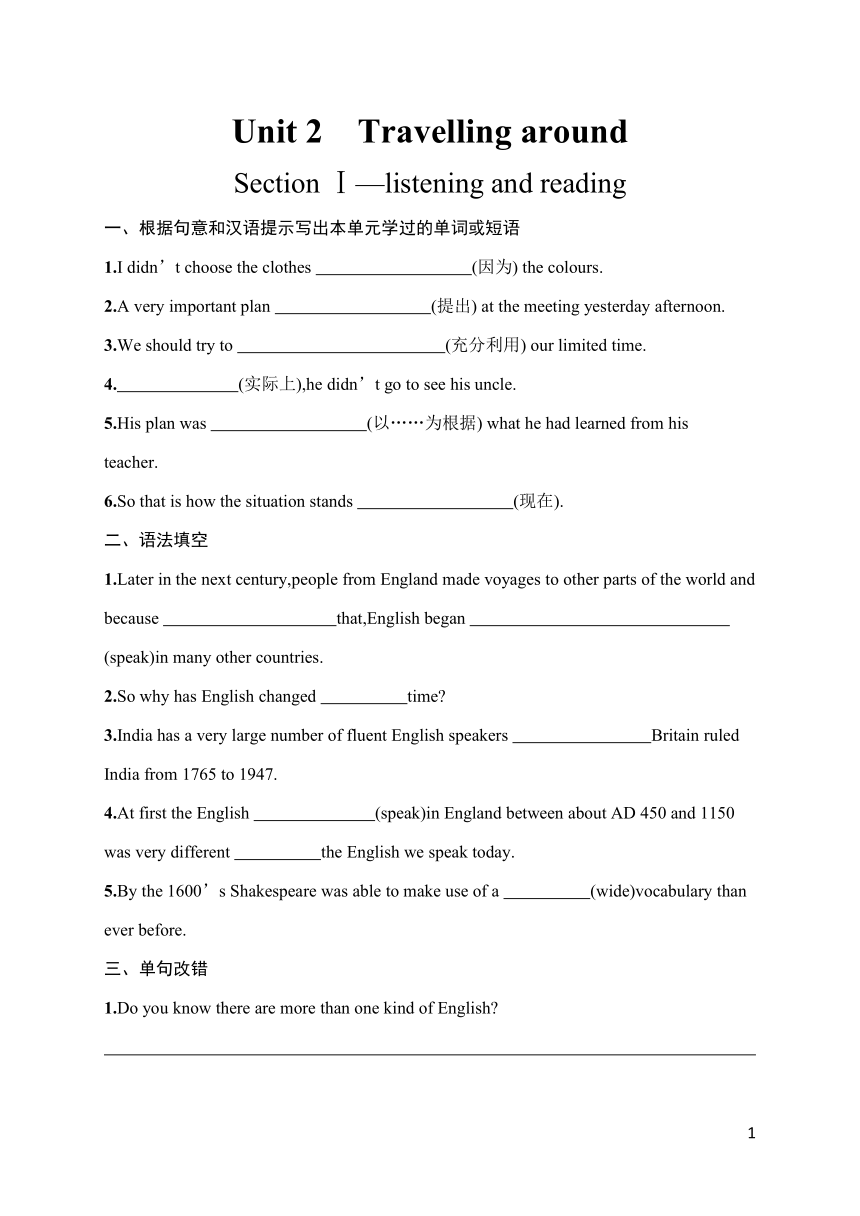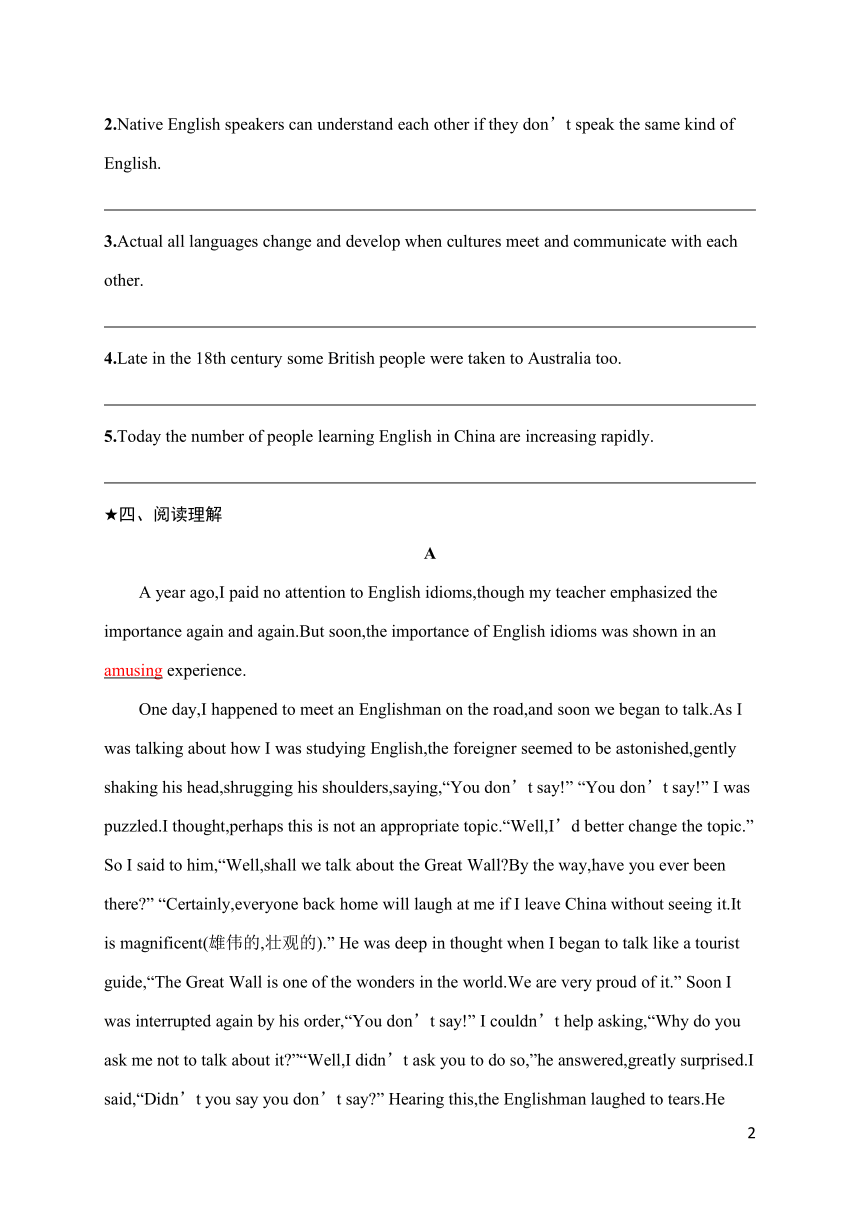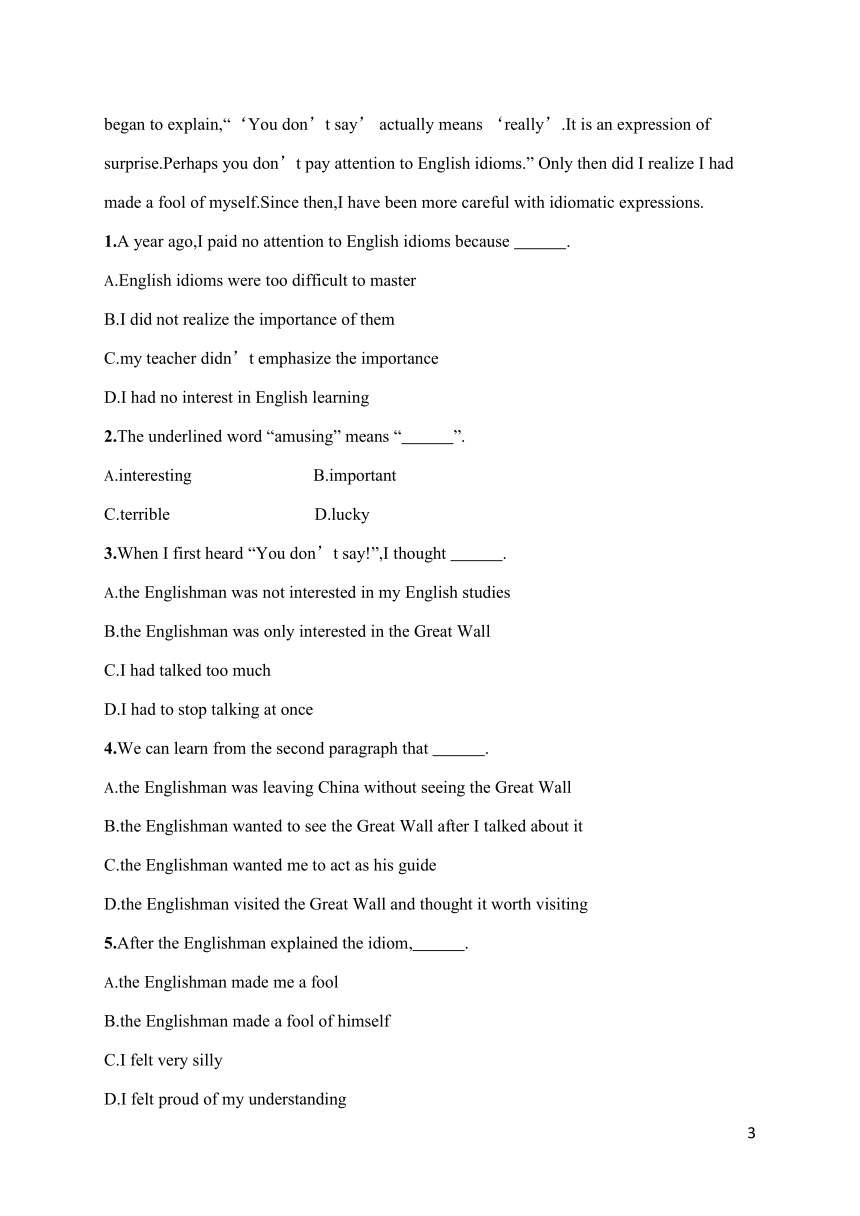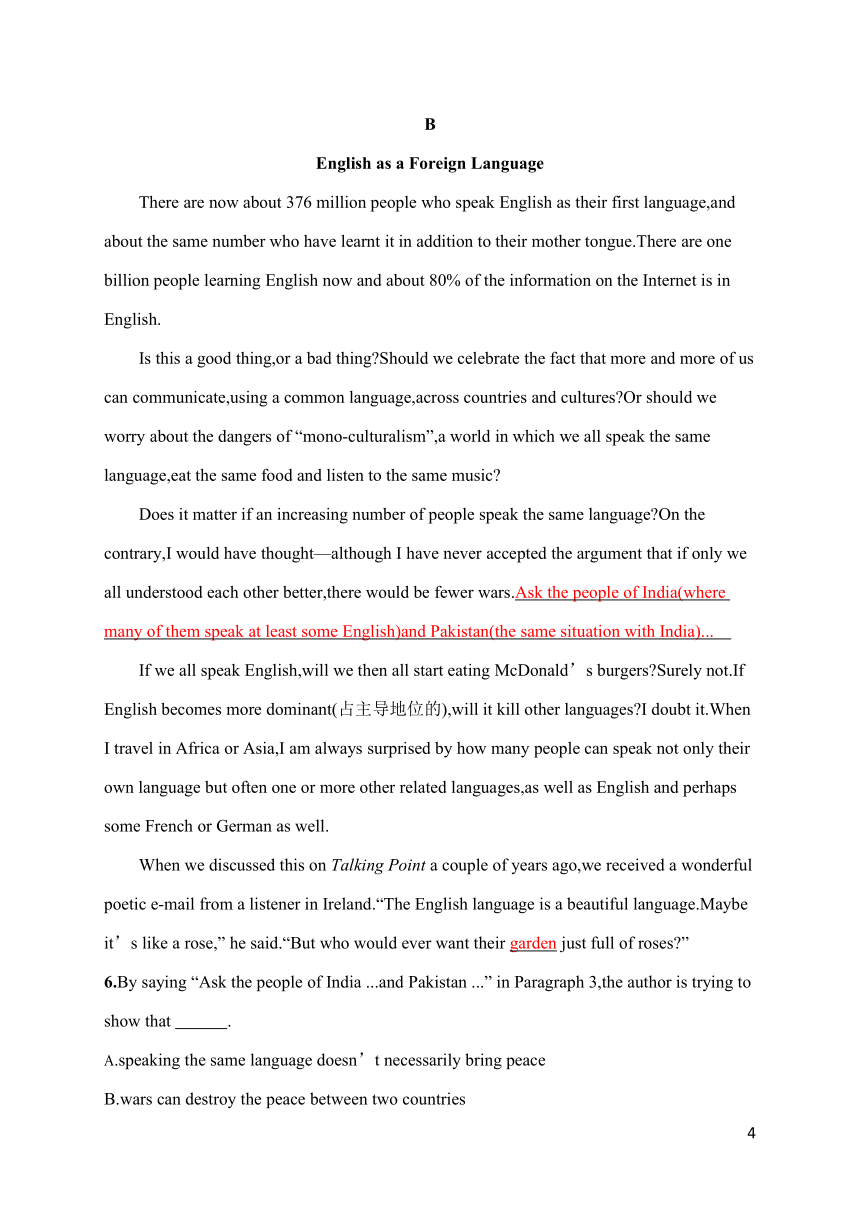人教版(2019)必修 第一册Unit 2 Travelling around listening and reading 同步练习(含答案)
文档属性
| 名称 | 人教版(2019)必修 第一册Unit 2 Travelling around listening and reading 同步练习(含答案) |

|
|
| 格式 | docx | ||
| 文件大小 | 33.9KB | ||
| 资源类型 | 教案 | ||
| 版本资源 | 人教版(2019) | ||
| 科目 | 英语 | ||
| 更新时间 | 2024-04-17 00:00:00 | ||
图片预览




文档简介
Unit 2 Travelling around
Section Ⅰ—listening and reading
一、根据句意和汉语提示写出本单元学过的单词或短语
1.I didn’t choose the clothes (因为) the colours.
2.A very important plan (提出) at the meeting yesterday afternoon.
3.We should try to (充分利用) our limited time.
4. (实际上),he didn’t go to see his uncle.
5.His plan was (以……为根据) what he had learned from his teacher.
6.So that is how the situation stands (现在).
二、语法填空
1.Later in the next century,people from England made voyages to other parts of the world and because that,English began (speak)in many other countries.
2.So why has English changed time
3.India has a very large number of fluent English speakers Britain ruled India from 1765 to 1947.
4.At first the English (speak)in England between about AD 450 and 1150 was very different the English we speak today.
5.By the 1600’s Shakespeare was able to make use of a (wide)vocabulary than ever before.
三、单句改错
1.Do you know there are more than one kind of English
2.Native English speakers can understand each other if they don’t speak the same kind of English.
3.Actual all languages change and develop when cultures meet and communicate with each other.
4.Late in the 18th century some British people were taken to Australia too.
5.Today the number of people learning English in China are increasing rapidly.
★四、阅读理解
A
A year ago,I paid no attention to English idioms,though my teacher emphasized the importance again and again.But soon,the importance of English idioms was shown in an amusing experience.
One day,I happened to meet an Englishman on the road,and soon we began to talk.As I was talking about how I was studying English,the foreigner seemed to be astonished,gently shaking his head,shrugging his shoulders,saying,“You don’t say!” “You don’t say!” I was puzzled.I thought,perhaps this is not an appropriate topic.“Well,I’d better change the topic.” So I said to him,“Well,shall we talk about the Great Wall By the way,have you ever been there ” “Certainly,everyone back home will laugh at me if I leave China without seeing it.It is magnificent(雄伟的,壮观的).” He was deep in thought when I began to talk like a tourist guide,“The Great Wall is one of the wonders in the world.We are very proud of it.” Soon I was interrupted again by his order,“You don’t say!” I couldn’t help asking,“Why do you ask me not to talk about it ”“Well,I didn’t ask you to do so,”he answered,greatly surprised.I said,“Didn’t you say you don’t say ” Hearing this,the Englishman laughed to tears.He began to explain,“‘You don’t say’ actually means ‘really’.It is an expression of surprise.Perhaps you don’t pay attention to English idioms.” Only then did I realize I had made a fool of myself.Since then,I have been more careful with idiomatic expressions.
1.A year ago,I paid no attention to English idioms because .
A.English idioms were too difficult to master
B.I did not realize the importance of them
C.my teacher didn’t emphasize the importance
D.I had no interest in English learning
2.The underlined word “amusing” means “ ”.
A.interesting B.important
C.terrible D.lucky
3.When I first heard “You don’t say!”,I thought .
A.the Englishman was not interested in my English studies
B.the Englishman was only interested in the Great Wall
C.I had talked too much
D.I had to stop talking at once
4.We can learn from the second paragraph that .
A.the Englishman was leaving China without seeing the Great Wall
B.the Englishman wanted to see the Great Wall after I talked about it
C.the Englishman wanted me to act as his guide
D.the Englishman visited the Great Wall and thought it worth visiting
5.After the Englishman explained the idiom, .
A.the Englishman made me a fool
B.the Englishman made a fool of himself
C.I felt very silly
D.I felt proud of my understanding
B
English as a Foreign Language
There are now about 376 million people who speak English as their first language,and about the same number who have learnt it in addition to their mother tongue.There are one billion people learning English now and about 80% of the information on the Internet is in English.
Is this a good thing,or a bad thing Should we celebrate the fact that more and more of us can communicate,using a common language,across countries and cultures Or should we worry about the dangers of “mono-culturalism”,a world in which we all speak the same language,eat the same food and listen to the same music
Does it matter if an increasing number of people speak the same language On the contrary,I would have thought—although I have never accepted the argument that if only we all understood each other better,there would be fewer wars.Ask the people of India(where many of them speak at least some English)and Pakistan(the same situation with India)...
If we all speak English,will we then all start eating McDonald’s burgers Surely not.If English becomes more dominant(占主导地位的),will it kill other languages I doubt it.When I travel in Africa or Asia,I am always surprised by how many people can speak not only their own language but often one or more other related languages,as well as English and perhaps some French or German as well.
When we discussed this on Talking Point a couple of years ago,we received a wonderful poetic e-mail from a listener in Ireland.“The English language is a beautiful language.Maybe it’s like a rose,” he said.“But who would ever want their garden just full of roses ”
6.By saying “Ask the people of India ...and Pakistan ...” in Paragraph 3,the author is trying to show that .
A.speaking the same language doesn’t necessarily bring peace
B.wars can destroy the peace between two countries
C.English doesn’t kill other languages
D.English is widely spoken in the world
7.What does the underlined word “garden” in the last paragraph probably stand for
A.Language. B.Family.
C.The world. D.The culture.
8.The author would probably agree .
A.it’s very hard to plant many kinds of flowers in a garden
B.it’s good for people from other countries to learn English
C.more and more people like to plant roses in their gardens
D.English is easier to learn than other languages
9.What does the passage talk about
A.Why English has become a global language.
B.How many people in the world speak English.
C.How people in the world learn English as a foreign language.
D.Whether we need to worry about English being a world language.
★五、七选五阅读理解
1 People use money to buy food,furniture,books,bicycles and hundreds of other things they need or want.When they work,they usually get paid in money.
Most of the money today is made of metal or paper. 2 One of the first kinds of money was shells.
Shells were not the only things used as money.In China,cloth and knives were used.In the Philippine Islands,rice was used as money for a long time.Elephant tusks,monkey tails and salt were used as money in parts of Africa.
The first metal coins were made in China.They were round and had a square hole in the centre. 3
Different countries have used different metals and designs for their money. 4 Sweden and Russia used copper to make their money.Later some countries began to make coins of gold and silver.
But even gold and silver were inconvenient if you had to buy something expensive.Again the Chinese thought of a way to improve money. 5 The first paper money looked more like a note from one person to another than the paper money used today.
Money has had an interesting history from the days of shell money until today.
A.They began to use paper money.
B.Money,as we know,is all made of paper.
C.The first coins in England were made of tin (锡).
D.But people used to use all kinds of things as money.
E.No one knows for certain when people began to use money.
F.Today anyone will accept money in exchange for goods and services.
G.People strung (串联)them together and carried them from place to place.
1.答案:because of
2.答案:came up
3.答案:make full use of
4.答案:Actually
5.答案:based on
6.答案:at present
1.答案:of;to be spoken
2.答案:over
3.答案:because
4.答案:spoken;from
5.答案:wider
1.答案:are→is
2.答案:if前加even
3.答案:Actual→Actually
4.答案:Late→Later
5.答案:are→is
1.答案:B
解析:细节理解题。由第一段可知,是因为我没有意识到它们的重要性。
2.答案:A
解析:词义猜测题。由下文所讲的经历非常有意思可知,amusing的含义是“有趣味的”。
3.答案:A
解析:推理判断题。因为开始时“我”和那个英国人谈论的是“我”的英语学习情况,那个英国人说“You don’t say!”直译为“你不要说了!”,“我”误解为他对此事不感兴趣。
4.答案:D
解析:细节理解题。由第二段的叙述可知,这个英国人参观了长城,并对其表示了赞扬。
5.答案:C
解析:细节理解题。由第二段倒数第二句“Only then did I realize I had made a fool of myself.”可知,“我”对自己的无知感到愚蠢可笑。
6.答案:A
解析:细节理解题。根据该画线部分前面的“...there would be fewer wars”可推断出,作者借助于印度和巴基斯坦来说明说同一种语言不一定带来和平。
7.答案:C
解析:词义猜测题。本文主要论述英语和世界之间的关系,因此如果英语是玫瑰,那么garden就应是整个世界。
8.答案:B
解析:推理判断题。根据短文第三、四段可知,作者认为学英语是一件好事情。
9.答案:D
解析:主旨大意题。本文主要讨论我们是否需要担心英语成为一门世界性的语言。
五、答案:1.F 2.D 3.G 4.C 5.A
5
Section Ⅰ—listening and reading
一、根据句意和汉语提示写出本单元学过的单词或短语
1.I didn’t choose the clothes (因为) the colours.
2.A very important plan (提出) at the meeting yesterday afternoon.
3.We should try to (充分利用) our limited time.
4. (实际上),he didn’t go to see his uncle.
5.His plan was (以……为根据) what he had learned from his teacher.
6.So that is how the situation stands (现在).
二、语法填空
1.Later in the next century,people from England made voyages to other parts of the world and because that,English began (speak)in many other countries.
2.So why has English changed time
3.India has a very large number of fluent English speakers Britain ruled India from 1765 to 1947.
4.At first the English (speak)in England between about AD 450 and 1150 was very different the English we speak today.
5.By the 1600’s Shakespeare was able to make use of a (wide)vocabulary than ever before.
三、单句改错
1.Do you know there are more than one kind of English
2.Native English speakers can understand each other if they don’t speak the same kind of English.
3.Actual all languages change and develop when cultures meet and communicate with each other.
4.Late in the 18th century some British people were taken to Australia too.
5.Today the number of people learning English in China are increasing rapidly.
★四、阅读理解
A
A year ago,I paid no attention to English idioms,though my teacher emphasized the importance again and again.But soon,the importance of English idioms was shown in an amusing experience.
One day,I happened to meet an Englishman on the road,and soon we began to talk.As I was talking about how I was studying English,the foreigner seemed to be astonished,gently shaking his head,shrugging his shoulders,saying,“You don’t say!” “You don’t say!” I was puzzled.I thought,perhaps this is not an appropriate topic.“Well,I’d better change the topic.” So I said to him,“Well,shall we talk about the Great Wall By the way,have you ever been there ” “Certainly,everyone back home will laugh at me if I leave China without seeing it.It is magnificent(雄伟的,壮观的).” He was deep in thought when I began to talk like a tourist guide,“The Great Wall is one of the wonders in the world.We are very proud of it.” Soon I was interrupted again by his order,“You don’t say!” I couldn’t help asking,“Why do you ask me not to talk about it ”“Well,I didn’t ask you to do so,”he answered,greatly surprised.I said,“Didn’t you say you don’t say ” Hearing this,the Englishman laughed to tears.He began to explain,“‘You don’t say’ actually means ‘really’.It is an expression of surprise.Perhaps you don’t pay attention to English idioms.” Only then did I realize I had made a fool of myself.Since then,I have been more careful with idiomatic expressions.
1.A year ago,I paid no attention to English idioms because .
A.English idioms were too difficult to master
B.I did not realize the importance of them
C.my teacher didn’t emphasize the importance
D.I had no interest in English learning
2.The underlined word “amusing” means “ ”.
A.interesting B.important
C.terrible D.lucky
3.When I first heard “You don’t say!”,I thought .
A.the Englishman was not interested in my English studies
B.the Englishman was only interested in the Great Wall
C.I had talked too much
D.I had to stop talking at once
4.We can learn from the second paragraph that .
A.the Englishman was leaving China without seeing the Great Wall
B.the Englishman wanted to see the Great Wall after I talked about it
C.the Englishman wanted me to act as his guide
D.the Englishman visited the Great Wall and thought it worth visiting
5.After the Englishman explained the idiom, .
A.the Englishman made me a fool
B.the Englishman made a fool of himself
C.I felt very silly
D.I felt proud of my understanding
B
English as a Foreign Language
There are now about 376 million people who speak English as their first language,and about the same number who have learnt it in addition to their mother tongue.There are one billion people learning English now and about 80% of the information on the Internet is in English.
Is this a good thing,or a bad thing Should we celebrate the fact that more and more of us can communicate,using a common language,across countries and cultures Or should we worry about the dangers of “mono-culturalism”,a world in which we all speak the same language,eat the same food and listen to the same music
Does it matter if an increasing number of people speak the same language On the contrary,I would have thought—although I have never accepted the argument that if only we all understood each other better,there would be fewer wars.Ask the people of India(where many of them speak at least some English)and Pakistan(the same situation with India)...
If we all speak English,will we then all start eating McDonald’s burgers Surely not.If English becomes more dominant(占主导地位的),will it kill other languages I doubt it.When I travel in Africa or Asia,I am always surprised by how many people can speak not only their own language but often one or more other related languages,as well as English and perhaps some French or German as well.
When we discussed this on Talking Point a couple of years ago,we received a wonderful poetic e-mail from a listener in Ireland.“The English language is a beautiful language.Maybe it’s like a rose,” he said.“But who would ever want their garden just full of roses ”
6.By saying “Ask the people of India ...and Pakistan ...” in Paragraph 3,the author is trying to show that .
A.speaking the same language doesn’t necessarily bring peace
B.wars can destroy the peace between two countries
C.English doesn’t kill other languages
D.English is widely spoken in the world
7.What does the underlined word “garden” in the last paragraph probably stand for
A.Language. B.Family.
C.The world. D.The culture.
8.The author would probably agree .
A.it’s very hard to plant many kinds of flowers in a garden
B.it’s good for people from other countries to learn English
C.more and more people like to plant roses in their gardens
D.English is easier to learn than other languages
9.What does the passage talk about
A.Why English has become a global language.
B.How many people in the world speak English.
C.How people in the world learn English as a foreign language.
D.Whether we need to worry about English being a world language.
★五、七选五阅读理解
1 People use money to buy food,furniture,books,bicycles and hundreds of other things they need or want.When they work,they usually get paid in money.
Most of the money today is made of metal or paper. 2 One of the first kinds of money was shells.
Shells were not the only things used as money.In China,cloth and knives were used.In the Philippine Islands,rice was used as money for a long time.Elephant tusks,monkey tails and salt were used as money in parts of Africa.
The first metal coins were made in China.They were round and had a square hole in the centre. 3
Different countries have used different metals and designs for their money. 4 Sweden and Russia used copper to make their money.Later some countries began to make coins of gold and silver.
But even gold and silver were inconvenient if you had to buy something expensive.Again the Chinese thought of a way to improve money. 5 The first paper money looked more like a note from one person to another than the paper money used today.
Money has had an interesting history from the days of shell money until today.
A.They began to use paper money.
B.Money,as we know,is all made of paper.
C.The first coins in England were made of tin (锡).
D.But people used to use all kinds of things as money.
E.No one knows for certain when people began to use money.
F.Today anyone will accept money in exchange for goods and services.
G.People strung (串联)them together and carried them from place to place.
1.答案:because of
2.答案:came up
3.答案:make full use of
4.答案:Actually
5.答案:based on
6.答案:at present
1.答案:of;to be spoken
2.答案:over
3.答案:because
4.答案:spoken;from
5.答案:wider
1.答案:are→is
2.答案:if前加even
3.答案:Actual→Actually
4.答案:Late→Later
5.答案:are→is
1.答案:B
解析:细节理解题。由第一段可知,是因为我没有意识到它们的重要性。
2.答案:A
解析:词义猜测题。由下文所讲的经历非常有意思可知,amusing的含义是“有趣味的”。
3.答案:A
解析:推理判断题。因为开始时“我”和那个英国人谈论的是“我”的英语学习情况,那个英国人说“You don’t say!”直译为“你不要说了!”,“我”误解为他对此事不感兴趣。
4.答案:D
解析:细节理解题。由第二段的叙述可知,这个英国人参观了长城,并对其表示了赞扬。
5.答案:C
解析:细节理解题。由第二段倒数第二句“Only then did I realize I had made a fool of myself.”可知,“我”对自己的无知感到愚蠢可笑。
6.答案:A
解析:细节理解题。根据该画线部分前面的“...there would be fewer wars”可推断出,作者借助于印度和巴基斯坦来说明说同一种语言不一定带来和平。
7.答案:C
解析:词义猜测题。本文主要论述英语和世界之间的关系,因此如果英语是玫瑰,那么garden就应是整个世界。
8.答案:B
解析:推理判断题。根据短文第三、四段可知,作者认为学英语是一件好事情。
9.答案:D
解析:主旨大意题。本文主要讨论我们是否需要担心英语成为一门世界性的语言。
五、答案:1.F 2.D 3.G 4.C 5.A
5
